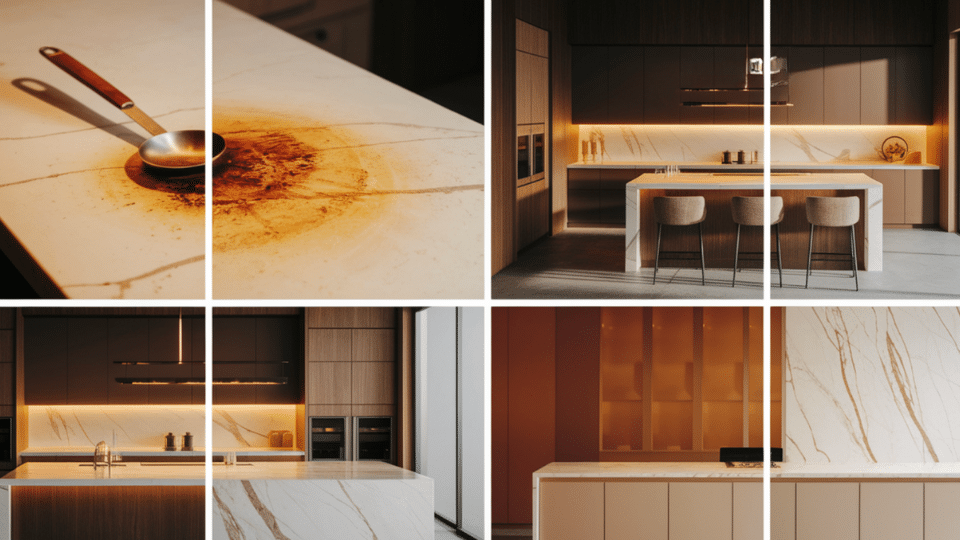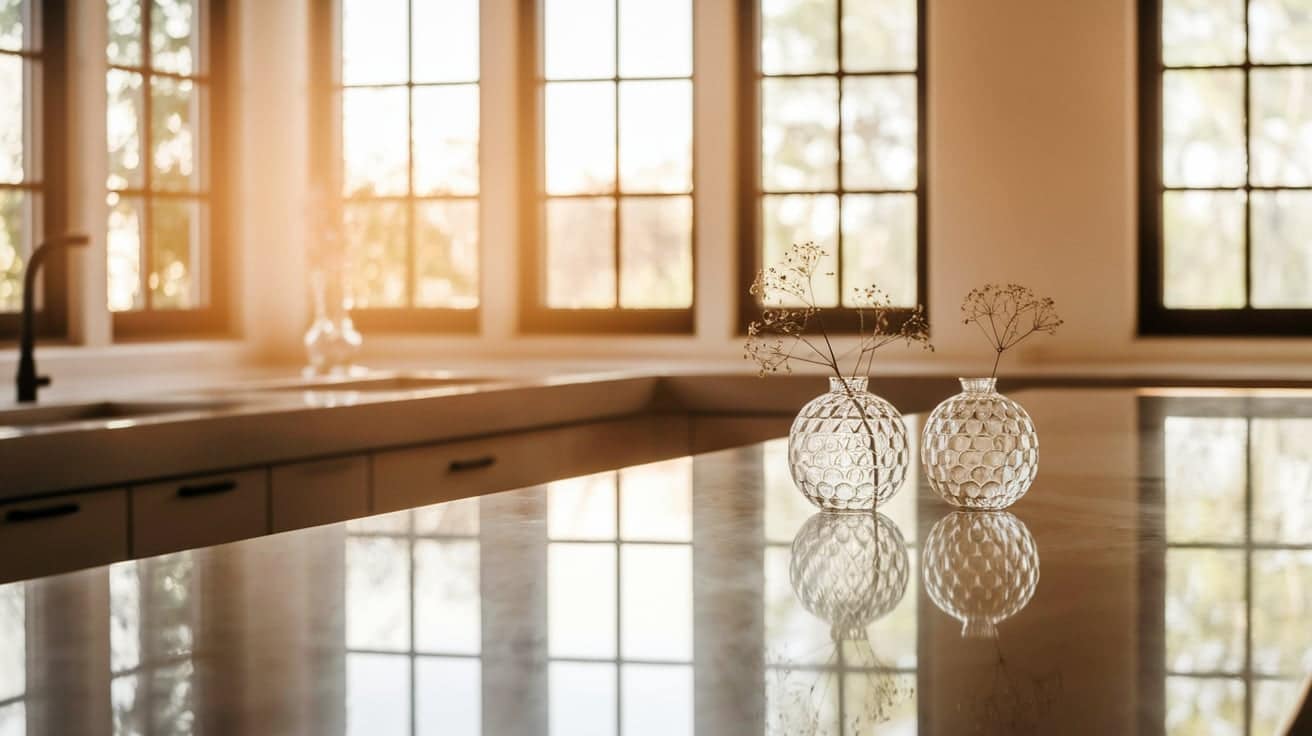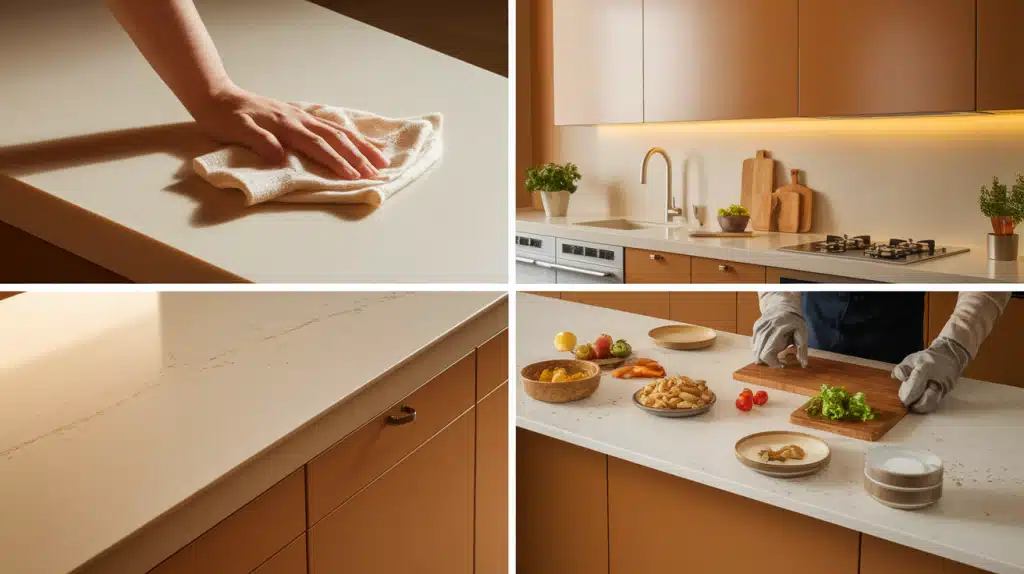Are Quartz Countertops Truly Man Made? Find Out Here
Considering your quartz countertop project, I wonder if it’s worth the investment.
You’re not alone; thousands of homeowners face this exact dilemma every year, caught between the allure of those Instagram-perfect kitchens and the reality of their budgets.
Most people focus on the price tag without understanding what they’re paying for. The truth is, knowing the real composition of quartz countertops and their genuine pros and cons can save you from expensive mistakes and buyer’s remorse.
I’ll break down exactly what goes into making quartz countertops, reveal the honest advantages and drawbacks that salespeople won’t tell you, and help you decide if quartz truly fits your lifestyle and budget.
Let’s cut through the marketing hype and get to the facts that matter for your home.
Are Quartz Countertops Man-Made?
Yes, quartz countertops are entirely man-made. They are engineered stone products manufactured in factories, not natural stone quarried from the earth.
Key Points
- Factory-made product – Created in manufacturing facilities using controlled processes.
- Mixed composition – 90-95% natural quartz crystals + 5-10% synthetic resins.
- Engineered design – Colors, patterns, and thickness are planned and controlled.
- Chemical processing – Uses heat, pressure, and binding agents.
- Not quarried stone – Unlike granite or marble, which come directly from quarries.
Quartz countertops are made from natural quartz crystals mined in locations such as Brazil and India. However, the manufacturing process makes them man-made.
Why They’re Considered Man-Made
- Contains synthetic resins and binders
- Requires factory equipment and processes
- Colors and patterns are artificially created
- Surface properties are engineered for performance
- Cannot exist in nature without human intervention
The term “engineered stone” is often used instead of “man-made” to describe quartz countertops. This engineering process offers quartz several advantages over natural stone, including a consistent appearance, non-porous surfaces, and improved stain resistance.
Natural vs. Man-Made Quartz: A Quick Comparison
table>
The Verdict: While natural quartz is a rare and beautiful material, its practical use as a countertop is limited due to its high cost, maintenance needs, and potential fragility.
Engineered quartz delivers 90-95% of nature’s durability, enhanced by human innovation for better consistency, ease of maintenance, and design flexibility.
Quartz Countertop Composition: What’s Inside?
You might be wondering, are quartz countertops man-made?
While quartz is a natural mineral, the process of creating quartz countertops involves combining it with resins and other materials, resulting in a final product that is an engineered, man-made surface.
| Component | Details |
|---|---|
| Primary Component | 90-95% crushed natural quartz crystals |
| Binding and Sealing Agents | 5-10% (8-10% in some formulations), including polyester resins, polymers, and pigments |
| Optional Additives | Crushed pieces of other minerals, recycled glass fragments, metallic flecks, mirror pieces |
| Resins & Polymers | Seal natural pores, make the surface non-porous, improve structural integrity, and impact resistance. |
| Pigments | Offer a wide color palette, vibrant and consistent designs, available in both natural and synthetic materials. |
| Manufacturing Process Impact | Compression under high pressure, vacuum sealing, curing in kilns, and polishing for the final finish |
| Key Limitation | Resins and pigments can burn or leave marks when exposed to excessive heat, thereby reducing their resistance to heat. |
Quartz countertops offer a perfect blend of natural strength and engineered innovation, making them a reliable and attractive choice for various surfaces. However, understanding their composition is key to appreciating both their advantages and limitations.
Is Quartz the Right Choice for Your Home?
Choosing the perfect countertop for your home is like picking the right partner – you want something beautiful, reliable, and capable of handling whatever life throws at it.
Quartz countertops have surged in popularity, but like any relationship, they come with their own set of advantages and challenges. Let’s dive into the honest truth about living with quartz.
The Bright Side: Why Homeowners Fall in Love with Quartz
1. Virtually Zero Maintenance Required
Say goodbye to the annual sealing ritual that granite and marble demand. Quartz countertops are non-porous by design, meaning they naturally resist stains, bacteria, and moisture without any protective treatments.
2. Incredible Durability That Goes the Distance
Quartz countertops are engineered to be tougher than most natural stones. They resist scratches from kitchen knives, won’t chip easily from dropped dishes, and can handle the daily abuse of a busy household.
3. Design Freedom Like Never Before
Unlike natural stone, where you’re at the mercy of what Mother Nature created, quartz offers virtually unlimited design possibilities.
4. Superior Hygiene and Food Safety
The non-porous surface isn’t just about preventing stains; it’s about creating a healthier kitchen environment. Bacteria, mold, and viruses cannot penetrate the surface or hide in the tiny pores of natural stone, unlike synthetic materials.
The Reality Check: Where Quartz Falls Short

1. Heat Sensitivity That Demands Respect
Here’s the irony: while natural quartz crystal can withstand extreme heat, engineered quartz countertops cannot. The resin binders that make quartz so durable and non-porous are also its Achilles’ heel when it comes to heat.
2. Premium Price Tag Without Apology
Quality comes at a cost, and quartz doesn’t pretend otherwise. At $50-200 per square foot installed, quartz often costs more than granite and significantly more than laminate or tile alternatives.
3. Visible Seams in Large Installations
While quartz slabs are available in generous sizes, they’re not infinite. Large kitchen islands, expansive countertops, or L-shaped configurations will likely require multiple slabs, resulting in visible seam lines where the pieces meet.
4. The “Too Perfect” Syndrome
Sometimes, quartz’s greatest strength, its consistency, becomes a weakness in the eyes of those who crave authenticity. The uniform patterns and flawless finish can look artificial or sterile compared to the organic variations found in natural stone.
Conclusion
So, are quartz countertops man-made? Absolutely. These engineered surfaces combine natural quartz with synthetic resins to create a superior product that surpasses what nature alone could provide.
Understanding this matters because it explains both the benefits and limitations you’ll live with daily. The man-made process gives you stain resistance, consistent patterns, and low maintenance. But it also means heat sensitivity and higher costs.
Your kitchen deserves a surface that matches your lifestyle. If you value durability and easy care over natural authenticity, quartz delivers on its promises. If you prefer a genuine stone character or have budget constraints, natural alternatives may be a better fit for you.
Ready to see quartz options in person? Visit local showrooms to compare colors, feel the texture, and get accurate pricing for your specific project. Your perfect countertop is waiting.









